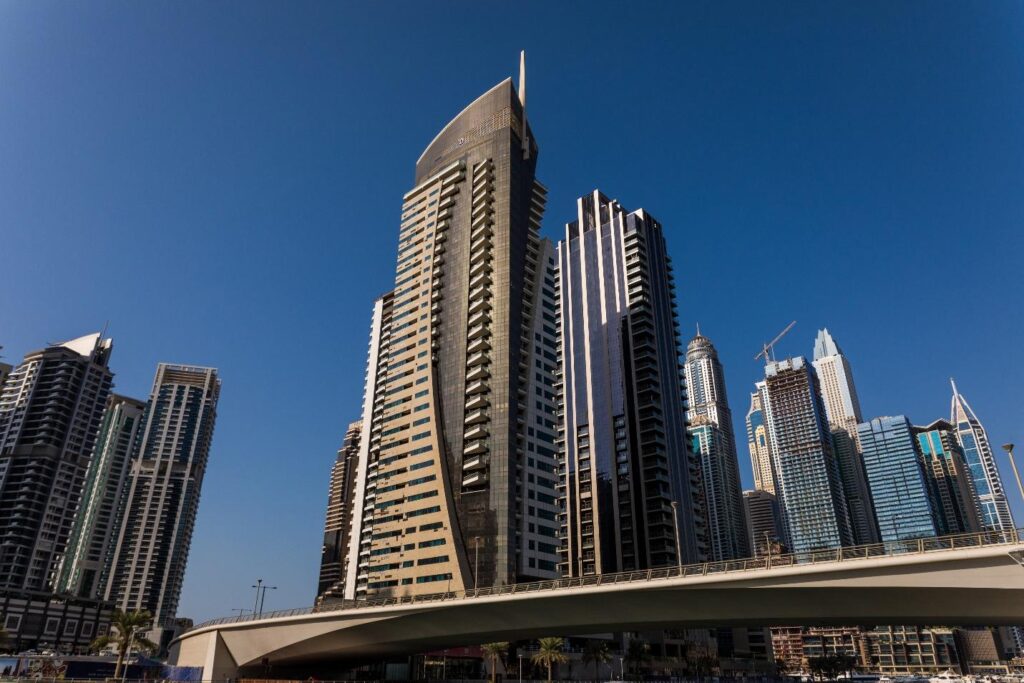For Americans trying to diversify their portfolios, investing in Dubai’s real estate market offers a special opportunity. Dubai has grown to be a top target for international investment with its thriving economy, opulent lifestyle, and friendly property rules for expats. Still, negotiating the home purchase process can be difficult. To guarantee a seamless and educated purchase, this article lists seven essential steps for U.S. investors to effectively buy property in Dubai.
7 Key Steps for Buying Properties in Dubai
1. Understand the Legal Framework
Familiarizing oneself with Dubai’s legal environment of the real estate market is essential before starting the buying process. Law No. 7 of 2006 is the basic law regulating property ownership, outlining the rights of both domestic and international investors.
Freehold vs. Leasehold Ownership
- Freehold Ownership: Grants the buyer complete ownership rights including the land and property.
- Leasehold Ownership: Usually spanning up to 99 years, leasehold ownership enables ownership for a designated duration but excludes land ownership.
Freehold properties in certain locations like Dubai Marina, Downtown Dubai, and Palm Jumeirah can be purchased by foreign investors. Knowing these differences helps you to match your investing objectives with a suitable type of property.
2. Set Your Budget and Financing Options
Before beginning your property hunt, you must first create a well-defined budget. Consider the following expenses:
- Purchase Price: The agreed-upon price for the property.
- Registration Fees: Approximately 4% of the purchase price is payable to the Dubai Land Department (DLD).
- Agent Commission: Typically around 2% of the purchase price.
- Mortgage Fees: If applicable, including processing fees and interest rates.
- Service Charges: Annual fees for maintenance of communal areas.
US investors have the option of paying cash or obtaining a mortgage from a local bank. While mortgage alternatives are open to both citizens and non-residents, cash purchasers frequently have greater negotiation leverage.
3. Engage a Reputable Real Estate Agent
Navigating Dubai’s complicated market calls for working with a qualified real estate agent. A trained realtor will assist in:
- Finding properties that fit your requirements.
- Offer analysis of price and market trends.
- Assist with negotiations and legal documentation.
Make sure your agent is registered with the Real Estate Regulatory Agency (RERA) to assure local regulation compliance.
4. Initiate Property Search
Once you have decided on your budget and hired an agent, you can find relevant properties for sale in Dubai on reputable real estate portals like Bayut. Pay particular attention to:
- Property type (apartments, villas, townhouses).
- Location preferences based on lifestyle needs (proximity to schools, hospitals, etc.).
- Investment potential (rental yields, capital appreciation).
Using these platforms will help you to simplify your search among the thousands of properties that Dubai offers for sale.
5. Draft and Sign the Memorandum of Understanding (MOU)
Once you have chosen a property, start discussions with the seller to decide on parameters including price and payment methods. Signing a Memorandum of Understanding (MOU) or Form F comes next, which outlines:
- Purchase price.
- Payment schedule.
- Any contingencies or conditions.
Both sides of this agreement have to sign it in the presence of a witness at the office of a Registration Trustee. Usually at this point, one needs a security deposit of around 10% of the property value.
6. Obtain a No Objection Certificate (NOC)
Following the MOU, both buyers and sellers must get a No Objection Certificate (NOC) from the developer. This certificate attests to the absence of any outstanding service charges or liabilities connected to the property. Usually taking place in the developer’s office, the meeting also requires payment of any applicable fees.
7. Complete Ownership Transfer
The last stage is transferring ownership at the Dubai Land Department office. Get ready by compiling the required paperwork, which includes:
- Manager’s cheque for the property price payable to the seller.
- Original identification documents (Emirates ID or passport).
- Original NOC from the developer.
- Signed MOU (Form F).
Submit this paperwork to the DLD office along with relevant payments. Verification will result in a new title deed in your name, therefore formally making you the owner of the property.
Key Considerations for U.S. Investors
Although buying real estate in Dubai is simple, numerous factors might improve your investing experience:
- Work with Registered Agents: Working solely with RERA-registered agencies guarantees local legal compliance.
- Document Translation: Any non-Arabic documentation has to be attested to and translated into Arabic.
- Registration Timeline: Transactions have to be reported within 60 days after contract signing to avoid fines.
Furthermore, knowing any tax obligations in your own country is crucial as American residents might have ongoing taxes on capital gains from overseas holdings or rental income.
Conclusion
For U.S. investors ready to negotiate Dubai’s distinctive terrain, investing in its real estate market has great prospects. Following these seven steps, you can guarantee a successful property acquisition journey in one of the most vibrant cities on earth. Dubai is a great place for real estate investment that offers both lifestyle advantages and financial rewards thanks to its friendly regulations for foreign ownership and many property possibilities ranging from luxury apartments to lavish villas.
Frequently Asked Questions
Q1: Are there any restrictions on the types of properties U.S. investors can purchase in Dubai?
A: Although a majority of properties in designated freehold zones are purchasable by U.S. investors, certain strategic or culturally important sites might be restricted. For particular restrictions, it’s advisable to speak with a local real estate professional.
Q2: How long does the entire process of purchasing a property in Dubai typically take?
A: Although the timeline varies, generally it takes 30 to 60 days from placing an offer to finish the transaction. Depending on the construction schedules, off-plan properties could have a longer timeline.
Q3: Can I obtain a residency visa by purchasing property in Dubai?
A: Yes, property owners are eligible for a renewable, 2-year property investor visa for investments above AED 750,000 (USD 204,192). There’s also an option for a Golden Visa that provides a 10-year residency visa with sponsorship support for the family. It requires a minimum investment of AED 2 million (544,514).


